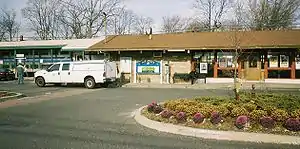Patchogue | |||||||||||
|---|---|---|---|---|---|---|---|---|---|---|---|
 Patchogue station from the entrance at Division Street & Cedar Avenue; December 26, 2007 | |||||||||||
| General information | |||||||||||
| Location | Division Street & South Ocean Avenue Patchogue, New York | ||||||||||
| Coordinates | 40°45′43″N 73°00′57″W / 40.761841°N 73.015735°W | ||||||||||
| Owned by | Long Island Rail Road | ||||||||||
| Platforms | 1 side platform | ||||||||||
| Tracks | 2 | ||||||||||
| Connections | |||||||||||
| Construction | |||||||||||
| Parking | Yes ($2.00 for 12 hours) | ||||||||||
| Bicycle facilities | Yes | ||||||||||
| Accessible | Yes | ||||||||||
| Other information | |||||||||||
| Fare zone | 10 | ||||||||||
| History | |||||||||||
| Opened | April 1869 (SSRRLI)[1] | ||||||||||
| Rebuilt | 1888, 1963, 1997 | ||||||||||
| Passengers | |||||||||||
| 2012—2014 | 1,191[2] | ||||||||||
| Rank | 71 of 125 | ||||||||||
| Services | |||||||||||
| |||||||||||
| Former services | |||||||||||
| |||||||||||
Patchogue is a station of the Montauk Branch of the Long Island Rail Road in Patchogue, New York. It is on Division Street between West Avenue (Suffolk County Road 19) and South Ocean Avenue. The station is the eastern terminus for some trains on the branch.
Ferries to Fire Island board from a port near the station.[3]
History

Between 1869 and 1879 Patchogue station was the east end of the South Side Railroad of Long Island. It even had spurs and roundhouses between West and Railroad Avenues, as well as another spur between River Avenue and West Avenue for the textile plant that more recently has served as the Patchogue Campus of Briarcliffe College. Prior to acquisition by the Long Island Rail Road there was a proposal by the SSRRLI to extend the main line southeast towards Bellport, then northeast to Brookhaven and Southaven. The station in Brookhaven was to be named "Fireplace" after Fireplace Neck.[4] The station was rebuilt in 1889 and again on July 30, 1963.[5][6] As part of the 1963 reconstruction, Railroad Avenue was terminated at Sephton Street, along the north side of the tracks, and the baggage and express house was torn down for additional parking. When Blue Point station was closed by the Long Island Rail Road in 1980, former Blue Point commuters opted to use Patchogue station. A high-level platform was constructed in the late 1990s.
PD Tower
In 1912, the Long Island Rail Road added a control tower to Patchogue Station on South Ocean Avenue, for both the Montauk Branch and the former trolley line owned by the Suffolk Traction Company. The tower was designated by the LIRR as the "PD Tower" and was also used for hooping. In 1970, all switches and crossing were automated, but hooping continued. At this point, the tower's structure began to decline. Residents began referring to it as the "Leaning Tower of Patchogue." On August 23, 2006 the tower was finally torn down.[7] Today, a flower garden can be found where the tower used to stand.
Station layout
The station has one six-car-long high-level platform on the south side of the two tracks; the north track, not next to the platform, is a siding.
| Track 1 | ← Montauk Branch toward Long Island City or Penn Station (Sayville) Montauk Branch limited service toward Speonk or Montauk (Bellport) → Montauk Branch termination track → |
| Side platform, doors will open on the left or right | |
Connections
- Suffolk County Transit buses 2, 6, 51, 53, 55, 66, 77, 77Y (77Y runs on weekday rush hours only).
- Patchogue-Village Transit bus routes
- Passenger ferries to Davis Park and Watch Hill on Fire Island.
References
- ↑ Vincent F. Seyfried, The Long Island Rail Road: A Comprehensive History, Part One: South Side R.R. of L.I., 1961
- ↑ "2012-2014 LIRR Origin and Destination Report : Volume I: Travel Behavior Among All LIRR Passengers" (PDF). Metropolitan Transportation Authority. August 23, 2016. PDF pp. 15, 198. Archived (PDF) from the original on July 17, 2019. Retrieved March 29, 2020.
Data collection took place after the pretest determinations, starting in September 2012 and concluding in May 2014. .... 2012-2014 LIRR O[rigin and ]D[estination] COUNTS: WEEKDAY East/West Total By Station in Numerical Order ... Patchogue
- ↑ "Life's a Beach on Long Island; The MTA LIRR is the "Greenest Way" to a Summer in Blue Ocean and White Sand Luxury". MTA. Retrieved March 20, 2013.
- ↑ Craige & Company's 1870 Southside Railroad of Long Island Map (Arrt's Arrchive)
- ↑ LIRR Station History (Dave Keller's Long Island Rail Road Photos & Recollections) Archived 2011-01-01 at the Wayback Machine
- ↑ Morrison, David D.; Pakaluk, Valerie (2003). Long Island Rail Road Stations. Images of Rail. Chicago: Arcadia Publishing. p. 96. ISBN 0-7385-1180-3. Retrieved November 25, 2011.
- ↑ Bleyer, Bill (August 23, 2006). "Historic LIRR tower is demolished". Newsday. Archived from the original on October 2, 2012. Retrieved December 30, 2006.
{{cite news}}: CS1 maint: unfit URL (link)
External links
- Patchogue – LIRR
- Patchogue LIRR timetable
- PD Tower (Unofficial LIRR History Website)[usurped]
- Older Patchogue Station(Newsday)
- Original Patchogue Station (Arrt's Arrchives)
- Patchogue Village Bus
- Railfan Recollections at LIRR "PD" Tower and signals (TrainsAreFun.com)
- More PD Tower Pics (May 1, 2006)
- Unofficial LIRR Photography Site (lirrpics.com)
- PD Interlocking and The Leaning Tower of Patchogue (The LIRR Today) (registration required)
- Station from Ocean Avenue from Google Maps Street View